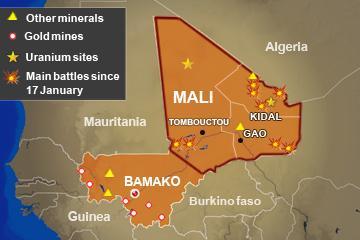
According to their statements, Mali’s military has executed a coup to ensure the unity of the country. What they have actually done is to have practically facilitated secession, as they now face immense internal and external pressures forcing them to hand over power to civilian authorities in the region. Now the country will face division from a position of weakness and what may have been considered a problem similar to those faced in the past, may end up changing the country for good.
The crisis in Mali: coup and secession quandary
Two major events occurred in the Republic of Mali in West Africa over the past two weeks that have drawn the country, as well as Africa’s Sahel region, into a major crisis. The first of these events was the military coup carried out against the government of President Amadou Toumani Touré. The coup immobilised the constitutional institutions of the country, and subsequently did not receive any international recognition.
The second event was that the National Movement for the Liberation of Azwad (MNLA), along with three other jihadist movements (al-Qaeda in the Islamic Maghreb, Ansar al-Din and the al-Jihad wa al-Tawhid Movement in West Africa), took control of the north of the country, especially the three main urban centers of Kidal, Gao and Timbuktu. After taking control, the MNLA announced that it had ceased operations, declaring the independence of the area as, in its words, the homeland of the Azwad people. This act of secession has also not been recognised by the international community.
In their statements, the military officers who carried out the coup have asserted that the coup was in protest against the country’s political and military leaderships’ betrayal in the fight against the MNLA. The officers claim that Touré's government did not provide enough arms and support for these battles with the rebels, while the leadership itself was endemically corrupt and ultimately unable to lead the military operations against the rebels.
The coup, however, has had an effect opposite to that asserted by those who carried it out. The coup has eliminated legitimate political leadership; split the military into a camp that supports the coup on the one hand and another that opposes it; and drained the energies of those who executed the coup who are now burdened with the task of securing their newly acquired authority. This has weakened the Malian troops fighting in the north, allowing the MNLA to seize the opportunity by taking control of the entire north of the country within three days, and almost without a fight.